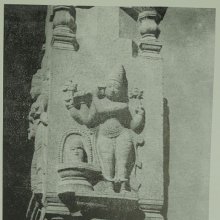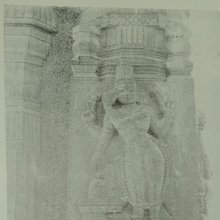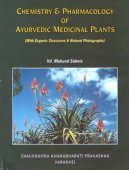Plucking: 3 definitions
Introduction:
Plucking means something in Hinduism, Sanskrit. If you want to know the exact meaning, history, etymology or English translation of this term then check out the descriptions on this page. Add your comment or reference to a book if you want to contribute to this summary article.
Images (photo gallery)
In Hinduism
Natyashastra (theatrics and dramaturgy)
Source: Shodhganga: Elements of Art and Architecture in the Trtiyakhanda of the Visnudharmottarapurana (natya)Plucking Flowers is associated with the Mukhaja variety of Sandaṃśahasta: one of the twenty-two Single-hand Gestures (in Indian Dramas) (known as asaṃyuktahastas), according to the Viṣṇudharmottarapurāṇa, an ancient Sanskrit text which (being encyclopedic in nature) deals with a variety of cultural topics such as arts, architecture, music, grammar and astronomy.—The word sandaṃśa means kaṅkamukha i.e., a pair of tong. Tong is a kind of tool which is used to hold something. [...] The Viṣṇudharmottarapurāṇa speaks of three kinds this form viz., agraja, mukhaja and pārśvakṛta and it gives detailed discussion of the usages of each one clearly. The mukhaja-sandaṃśa-hasta is used to show the activity of plucking flowers.

Natyashastra (नाट्यशास्त्र, nāṭyaśāstra) refers to both the ancient Indian tradition (shastra) of performing arts, (natya—theatrics, drama, dance, music), as well as the name of a Sanskrit work dealing with these subjects. It also teaches the rules for composing Dramatic plays (nataka), construction and performance of Theater, and Poetic works (kavya).
Yoga (school of philosophy)
Source: ORA: Amanaska (king of all yogas): A Critical Edition and Annotated Translation by Jason BirchPlucking out (lumps of hair) is denoted by the Sanskrit term Luñcana, according to the Amanaska Yoga treatise dealing with meditation, absorption, yogic powers and liberation.—Accordingly, as Īśvara says to Vāmadeva: “[...] Putting on ochre garments, carrying a skull, plucking out (luñcana) clumps of hair, maintaining non-vedic religious observances, ashes, ascetic clothing and matted locks, behaving as if mad, [the ascetic practice of] nakedness, [studying] the Vedas, Tantras and so on and the meeting [of learned people] for [reciting] poetry in the assembly: All [this] is exertion for the sake of filling one's stomach and is not the cause of the highest good. [...]”.

Yoga is originally considered a branch of Hindu philosophy (astika), but both ancient and modern Yoga combine the physical, mental and spiritual. Yoga teaches various physical techniques also known as āsanas (postures), used for various purposes (eg., meditation, contemplation, relaxation).
Ayurveda (science of life)
Toxicology (Study and Treatment of poison)
Source: Shodhganga: Kasyapa Samhita—Text on Visha ChikitsaThe Plucking of medicinal herbs and associated rules is described in the Kāśyapa Saṃhitā: an ancient Sanskrit text from the Pāñcarātra tradition dealing with both Tantra and Viṣacikitsā—an important topic from Āyurveda which deals with the study of Toxicology (Viṣavidyā or Sarpavidyā).—The Kāśyapa Saṃhitā has informative passages describing the procedure and time, of plucking the medicinal herbs, the maximum potency that can be had from them, the secret of preserving one’s individual health by diverse methods and lead a healthy, meaningful life.

Āyurveda (आयुर्वेद, ayurveda) is a branch of Indian science dealing with medicine, herbalism, taxology, anatomy, surgery, alchemy and related topics. Traditional practice of Āyurveda in ancient India dates back to at least the first millenium BC. Literature is commonly written in Sanskrit using various poetic metres.
See also (Relevant definitions)
Full-text (+156): Ulluncana, Luncana, Lava, Vrithalambha, Pushpapracaya, Udvivarhana, Hurada, Katabhanga, Ankusha, Avacaya, Samloca, Pracaya, Ocinanta, Upatani, Alunca, Kilke, Pacinanta, Pushpapacaya, Lumcana, Hisakani.
Relevant text
Search found 53 books and stories containing Plucking; (plurals include: Pluckings). You can also click to the full overview containing English textual excerpts. Below are direct links for the most relevant articles:
Dhammapada (Illustrated) (by Ven. Weagoda Sarada Maha Thero)
Verse 285 - The Story of a Venerable who had been a Goldsmith < [Chapter 20 - Magga Vagga (The Path)]
Verse 44-45 - The Story of Five Hundred Monks < [Chapter 4 - Puppha Vagga (Flowers)]
Puranic encyclopaedia (by Vettam Mani)
'The Heroic Mother' < [December 1938]
After Their Boy Leaves Home < [April – June, 2005]
Separation < [January – March, 1979]
Village Folk-tales of Ceylon (Sri Lanka), vol. 1-3 (by Henry Parker)
Story 52 - The Wimali Story < [Part II (b) - Stories of the Tom-tom Beaters]
Story 30 - The Jackal And The Hare < [Part I - Stories told by the Cultivating Caste and Vaeddas]
Story 12 - The Black Storks’ Girl < [Part I - Stories told by the Cultivating Caste and Vaeddas]
The Brihaddharma Purana (abridged) (by Syama Charan Banerji)
Chapter 11 - History of the Bel tree (continued, 3)
Chapter 8 - History of Tulsi plant (continued)
The Religion and Philosophy of Tevaram (Thevaram) (by M. A. Dorai Rangaswamy)
Nayanar 38: Gananatha (Kananata) < [Volume 4.1.1 - A comparative study of the Shaivite saints the Thiruthondathogai]
Related products


